- Home
- Roddy Doyle
Bullfighting: Stories Page 3
Bullfighting: Stories Read online
Page 3
—You do already.
—I know.
Just don’t boil them to fuck.
He didn’t say it. He didn’t even think it, really.
He shrugged.
—It’s just ... Anyway. Now you know.
They sat at the table. He thought about Noel.
They walked up to the church together, him and Lizzie; it was no distance from the house. There was a big crowd, waiting on the steps and on the bits of grass, out onto the street.
—That’s good, he said to Lizzie.
He wasn’t sure why. A bit of a comfort for Noel’s wife and kids who’d be arriving soon in the black cars, with the hearse. It was what he’d have thought. My husband was popular. All these people knew my father. Familiar faces. Unfamiliar faces. He’d had a big, full life.
Martin had bought a new shirt, to go with his jacket. It was a bit tight on him, but grand as long as he kept the jacket on. He’d be losing weight soon. The whole new regime. Fruit, grains. The fresh veg. Legumes. Another of the words he’d had to find in the dictionary. Peas, beans. Health and boredom.
He hadn’t slept. Not since Noel had died. Since a good bit before, actually. He’d jump awake before he was really asleep. Afraid to sleep. Afraid of falling. His skin was dry. He saw that when he brought his face up to the mirror. Dry skin all over his face. Especially across his forehead and at the sides of his nose. And spots. He could feel them, threatening, angry, right over his forehead. He looked desperate.
—Stress, said Lizzie.
He nodded.
—Grief.
—He’s only dead a few days, he said.
—You’ve known for two years, she said back.
She was right. It made sense. The death, the news, hadn’t done anything. He’d known what it was when the phone rang. He’d been waiting.
The sleep was the worst part. One good night would have made the difference, would have put whatever was missing back under his skin. That was how he felt, what he nearly believed. The night before, Lizzie had handed him a bottle of Benylin, the cough mixture, half empty and sticky. He hadn’t seen Benylin since the kids had grown up.
—Take a mouthful of that.
He looked at it.
—What’s the best-before date? he said.—It must be fuckin’ ancient.
—Never mind the date, she said.—If it pours out it’s grand.
He got the lid off. He filled his mouth. He’d always liked the taste of it. He swallowed.
—Here, she said.
He gave her the bottle. She put it to her mouth and swallowed the rest.
—Goodnight, she said.
—Goodnight.
He conked out but he was awake again at half-three. Wide awake. Looking at the ceiling becoming brighter, the big swinging cobweb he always meant to get at with the brush. He got up. Had his breakfast. His new breakfast – a sliced banana, a sliced pear. Yum fucking’ yum. It was alright though, and good for him. He was hungry again by the time the rest of them got up.
They stood at the church gate and chatted a bit as they waited for the hearse. It was weird, like pretending they weren’t there for the funeral.
—Here they come.
The hearse came off the road, and up, past them, to the front of the church. They blessed themselves. The coffin in there – Noel. It didn’t seem real. And the black cars, after the hearse. Two of them. The wife, the kids, a boyfriend; his sisters, the brother from Australia. They watched as they all got out of the cars and the undertaker’s men took the coffin from the back of the hearse and carried it into the church.
He and Lizzie went about halfway up the aisle, not too near, not too far back. Martin hadn’t been in the church in years. But he remembered it exactly, how cold it always was. How far down his knees would have to go before they landed on the padding that ran under the back of the seat in front of him, when the priest told them to kneel. How Jesus in the Stations of the Cross looked a bit like Keith Richards. He was going to show Lizzie, to remind her.
But he heard the gasp. That was what it sounded like, the whole place gasping, softly, everybody there. He looked. Noel’s wife was walking away from the coffin. She’d put a framed photograph on top of it.
Noel. That was what the gasp was for. Noel, twenty-five years before.
—Jesus. Look at that.
He’d forgotten. He’d forgotten that Noel used to look like that. A big man with a big grin and a big collar on his red shirt. A big handsome man. A young man, looking back at the camera. Right into his future.
He’d forgotten. The last two years, they’d watched Noel get smaller. And, in the last months, the smaller version became the man. The man Martin hoped he wasn’t talking to for the last time. He’d looked at him carefully, already remembering, storing him away. And he’d forgotten about the real man. The full man. But there he was now, on the coffin.
It should have been heartbreaking. And it was. Seeing the faded colour, the big collar. He felt guilty. He’d let himself forget. He’d let the sick man become the man. He’d forgotten why Noel had been Noel, why they’d been friends. But there was more – the guilt didn’t settle. He could feel it, and hear. The gasp had become whispers. The photograph. Noel’s wife – Barbara – her putting the picture there, on the coffin, that was brilliant. And brave – going up there, letting the wood of the frame clatter against the coffin lid. Keeping her hands steady. She was even smiling when she came back and sat down.
Martin could see Davie in front of him, and the other men he knew and liked, all looking at each other, over other people’s heads, smiling. Sad and good had become the same thing. Martin wanted to talk. He wanted to laugh. He wanted to stop being the man with diverticular disease. He felt Lizzie beside him. He nudged her knee with his. She nudged back.
The priest was walking over to the platform beside the altar, and the microphone. Martin heard a soft voice somewhere behind him, a man.
—Here goes.
They stood.
Teaching
—You know my mother.
The girl stood beside his desk. She was one of those big-eyed kids. She’d always look a bit like a kid. By the time she was thirty-five, she’d be a strange-looking kid.
—You know my mother, she said again.
Now though, she was one of those lovely kids. She’d stopped, hesitated, on her way past his desk to the door. One of the last out. She’d probably made sure of that. It was her first full day in the secondary school.
He finished what he was doing. Searching for a red biro at the bottom of his bag. And he looked at her.
—Is that right? he said.
—Yeah.
He looked for her mother in the kid’s face.
Big eyes. He stopped looking. He could feel the sweat on his forehead.
—Who is she? he said.
—Amanda Collins, she said.
—Amanda Collins?
—Yeah. Do you remember her?
—I do, yeah.
But he didn’t.
—How is she?
—She’s grand, said the kid.
—Good.
—She says they all fancied you.
She wasn’t the first. The last five or six years, kids had been stopping at his desk. Their first day, their big news. You knew my ma or my da.
This was killing him.
It was getting harder. Getting through the day, the nine class periods. It was the first week in September.
She was still there. He’d have to say something. Silence wouldn’t work.
—It’s hard to imagine, he said.—Isn’t it?
—Yeah.
He looked at her. He laughed – relief. He couldn’t believe he’d been so stupid. Even as he heard himself say it. Like some seedy old man, flirting or something.
She laughed too. A lovely kid. Open. Like her mother must have been. Why he’d loved teaching, when he’d started, and for a long time afterwards.
He didn’t drink in the day. His head
was telling him he should, something quick to swallow the headache. But he didn’t. He never had and he never would. There was no flask or bottle in his bag. No quick dash down to the local. Too many parents, too much self-respect.
He used to like it, kids stopping for a chat. What groups are you into, sir? Our cat’s after having kittens. D’you want one, sir? Things like that. He used to write down the best of them.
It didn’t really happen now. Kids didn’t stop. He wrote down nothing.
The kid here was going.
—See you tomorrow, sir.
He looked at his timetable. It was open, on his desk.
—Yes, he said.—Tomorrow. Bye.
—Bye.
She left the door open. A lovely kid. He’d smile every time she walked in, for the next six years.
He went to the door. He used to stand there between classes and watch the world go by. All those tall and tiny children. More than a thousand of them on the move. He could have named most of them. He shut the door.
Things changed. It wasn’t just him. He wasn’t denying anything: his heart wasn’t in it. He wished he was somewhere else. But there weren’t as many students now; the area outside was changing. The corridor wasn’t as packed as it had been when he’d started, twenty-three years before.
He looked again at the timetable. He sat down. He had to bring the page closer to his eyes. He didn’t have a class now; he was free till eleven o’clock.
It wasn’t just him. Something had happened. A kid stopping at the desk, a boy or a girl, had become something to be wary of, almost to dread. They’d been given talks, in the staffroom, on the telltale signs – the eyes, marks, cuts. He was probably the only member of staff left who hadn’t been told an abuse story. He’d expected it to happen. For a long time. He’d felt left out when it didn’t. He’d even been ready to make up something, when a gang of the teachers had gone for an impromptu pint after work. The urge to tell, to get back his status as one of the nice teachers. But he’d been wise; he’d kept his mouth shut.
He looked at the timetable again. He had two classes left to lunchtime, and another two after. That wasn’t too bad. He looked at his watch. The headache was starting to lift. He’d be better in the next class; he’d get up and move around. He’d be Robin Williams for half an hour, in Dead Poets Society. One of those Seize the Day classes. The way he used to be, all day. He’d even said it once. Seize the day, boys and girls. They’d cheered.
He had an abuse story of his own. He’d been in First Year, like the big-eyed kid who’d just left. A few months in the new school, and he knew hardly anyone. He’d been sent to the Christian Brothers and he still hadn’t got used to them. They were strange men, sometimes funny, but savage and unpredictable. The lay teachers were as bad. If he listened, he could hear shouting or crying, someone being hit, in another part of the building. The noises were always hanging there. Once, he remembered, a boy in the room next door was thrown against the classroom wall, and he watched the blackboard on his side come off its hinges and fall to the wooden floor. They’d laughed. They’d all laughed. They’d laughed at everything.
There was one of the brothers, Brother Flynn. Latin and civics. He’d stand at the front of the room and smile and rub his big hands. But he could just as easily bring the hands down on someone’s head, one onto each ear. The front desk was a death sentence. But, really, Flynn was alright. He was the only teacher who used their first names. He didn’t go mad when he saw the names of English football teams on the covers of their books and copies. Flynn was a laugh.
But Flynn liked him. He’d smile at him when he was testing their Latin vocabulary. The others noticed.
—Smile back and he won’t give us any homework.
—Lay off.
—Go on, yeh queer.
—Fuck off.
Flynn patted his shoulder one day as he was going past. He wanted to cry. He wanted to get out the window, drop to the ground, run into the sea across the road. He knew the others were looking. He knew they’d be waiting to get him when the bell went and Flynn left the room. He hated Flynn and he needed him in the room.
It had only lasted for a while. He got to know a few of the other lads. They got the same bus home; he made them laugh. They knew he was sound, and soon the stuff about Flynn became a joke. He was one of them now, so he wasn’t a queer. Flynn still smiled, and it didn’t matter.
Then he was sick. One morning, he felt hot. His forehead, his whole face, was suddenly wet with sweat. He put his hand up.
—Brother!
He was going to puke. Flynn must have noticed, must have seen the colour dropping off his face. He opened the door.
—Quick, quick!
Flynn was standing outside when he came back out of the toilet. He smiled at him. He said he’d drive him home. He told Flynn that his mother wouldn’t be there; she went to his granny’s on Mondays, two buses across the city.
Flynn took him over to the house where all the Brothers lived, beside the school. He’d never been in the house before. He’d never really been near it. It was a rule that never had to be remembered: don’t go near the Brothers’ house. Water dripped from the roof of the porch onto the red and black tiles.
—Mind you don’t slip, said Flynn.
He remembered shivering, remembered feeling the cold on his skin.
Flynn opened the front door. He followed him into the hall. The same red and black tiles.
—Shut the door.
He pushed the front door closed. The lock was colossal, a big black box screwed right into the wood.
Flynn kept walking. He stood for a while, then followed him. Flynn’s black shoes on the tiles, and his own shoes – they were the only noises. The house was empty. He’d seen the housekeeper once, a woman much older than his mother, walking towards the Brothers’ house with a net shopping bag full of apples. But she wasn’t there now. He could tell – something about the cold: the house had been empty for hours.
Flynn pulled open a door. He disappeared behind it, then came back out, backwards. He was dragging something. It was a fold-up bed, on castors. The castors squealed across the tiles. Flynn dragged the bed across the hall, to another door. He stayed where he was. Flynn was still going backwards, pulling the bed, looking at him.
—Come on, he said.
He didn’t move. He remembered that. He remembered the slow terror, in his legs.
—Come on, said Flynn.—Quick now.
He watched, stayed at the door, as Flynn unfolded the bed. He heard him grunt as he pushed the two sides down. It was the dining room, or something. Flynn pushed the bed against the long table.
—There you are. Lie down.
Flynn walked across to the window. He heard him pull the curtains. It didn’t make the room much darker. He sat down on the bed. It moved a bit, on the castors. He took off his shoes. He stood up again. He could hear Flynn’s feet. He pulled back the grey blanket. The mattress was bare, and striped.
He lay down. He felt the bed move under him again, just a bit, an inch. He pulled the blanket over his chest. The room got darker. Flynn was standing in front of the light coming from the hall.
—How’s the tummy now?
—Alright, Brother.
—Are you going to be sick again, d’you think?
—No, Brother.
He felt the blanket being pulled away from him, but he couldn’t see Flynn’s hands. Then he saw Flynn’s face, close to his own. He was leaning over him. The blanket was gone. Then it was back; he felt it land on his legs, his waist, his chest. He felt Flynn’s hands at his neck. He could feel Flynn’s knuckles, on his chin. Flynn was holding the blanket. He was tucking it under his neck. He was looking down at him. He was smiling.
That was it, all he could remember. He half expected more to open up – the hand grabbing his neck, holding him down – but it never did. He’d told someone about it once, a woman at a party. He’d stopped where his memory stopped, at the man tucking the blanket under
the boy’s chin. He was sitting beside the woman, two kitchen chairs side by side. She looked at him, then told him that he was an apologist for the Catholic Church. She stood up as she said it.
There was something, colour, at the corner of his eye. He glanced over at the classroom door. The principal was looking in the window. She waved, and went. He looked down at his desk. What had she seen? His diary was open, so was one of his books. His timetable. His pen was there as well. It was fine. He was working. He felt his face. He’d shaved that morning.
Not that it mattered. It had never mattered, that kind of idiocy, in this school. How you taught, not how you dressed; that was what mattered. It was one of the things he’d loved about the place. But he’d noticed. His beard had changed colour. There was grey in it, even a bit of white. He looked like a wino or something if he didn’t shave every second day.
The principal was younger than he was. She’d come to the school four years after he had. He’d kissed her once – he cringed; he looked at the window.
He looked at his timetable. It was darker in the room now; it was going to rain. This had been his room for more than twenty years. He knew the light and every noise.
He’d do something about the drinking. He’d give it up. He would – he could. He’d watched a football match the night before, the Champions League, on RTE, the whole thing. But he didn’t know who’d played. He remembered nothing. Not a thing. He’d have to read the report in the paper before lunch; the paper was in his bag. Then he’d be able to talk about it, if he talked to anyone. But he’d probably stay in the room. Plan his classes.
He’d stop. The drinking. He wasn’t fooling himself. He knew it was serious.
He’d kissed her. That first year she’d been in the school. After a union meeting.
He smiled. The absurdity. The idea of kissing her now. He looked at the window in the door. There was no one there. He looked at the timetable. Sixth Year English was next. A double class, Ordinary level. There were no Honours classes on his timetable. It was five years since he’d had an Honours class. Nothing had been said.
These kids were fine. He’d had them last year. But there was no life in them. He’d have sworn it was true. It just wasn’t like it used to be.

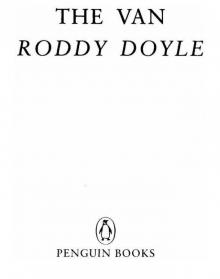 The Van
The Van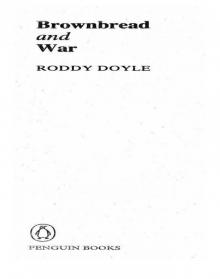 Brownbread & War
Brownbread & War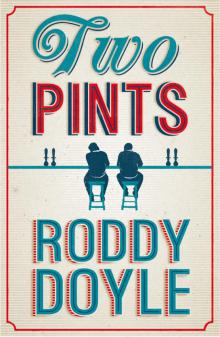 Two Pints: A Collection
Two Pints: A Collection Rover and the Big Fat Baby (Giggler 4)
Rover and the Big Fat Baby (Giggler 4)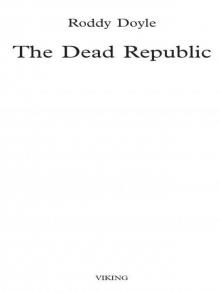 The Dead Republic
The Dead Republic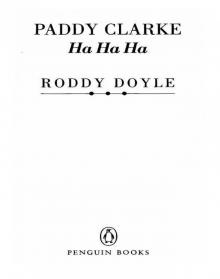 Paddy Clarke Ha Ha Ha
Paddy Clarke Ha Ha Ha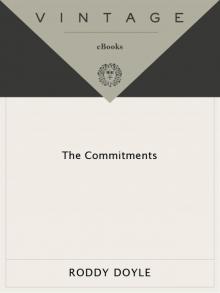 The Commitments
The Commitments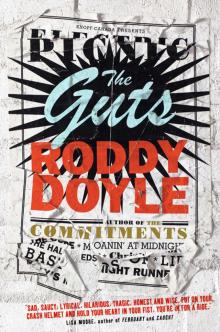 The Guts
The Guts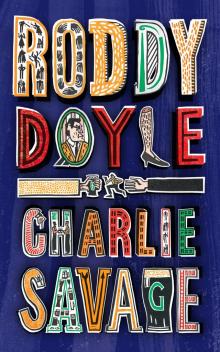 Charlie Savage
Charlie Savage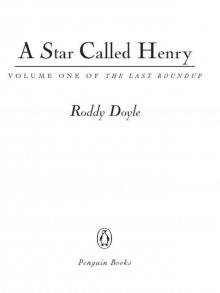 A Star Called Henry
A Star Called Henry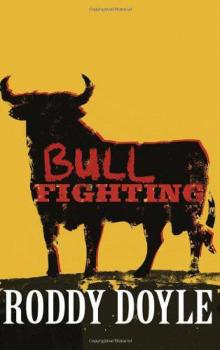 Bullfighting: Stories
Bullfighting: Stories Two More Pints
Two More Pints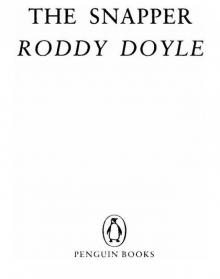 The Snapper
The Snapper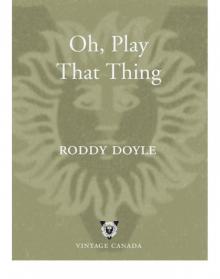 Oh, Play That Thing
Oh, Play That Thing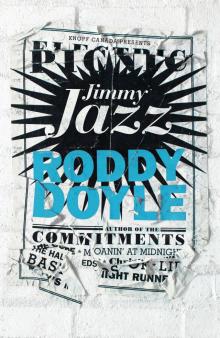 Jimmy Jazz
Jimmy Jazz Paula Spencer
Paula Spencer Wilderness
Wilderness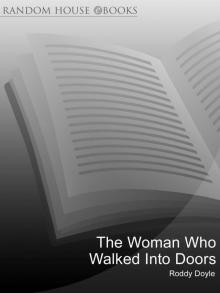 The Woman Who Walked Into Doors
The Woman Who Walked Into Doors The Deportees
The Deportees Rover and the Big Fat Baby
Rover and the Big Fat Baby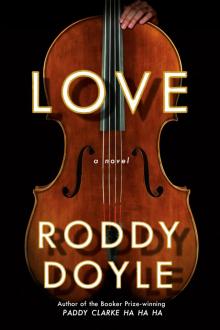 Love
Love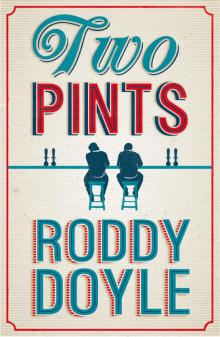 Two Pints
Two Pints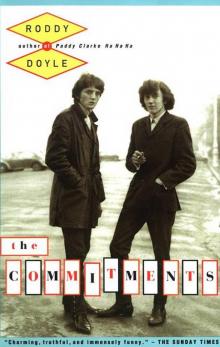 The Commitments b-1
The Commitments b-1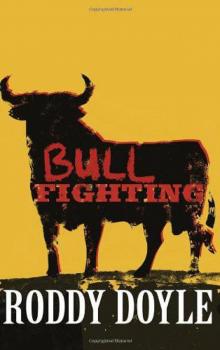 Bullfighting
Bullfighting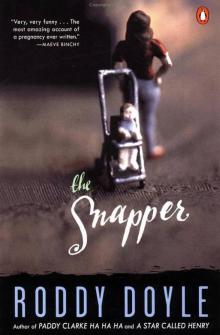 The Snapper b-2
The Snapper b-2